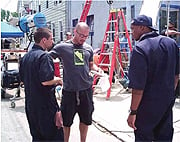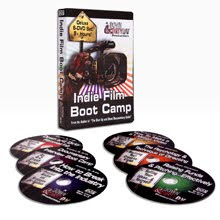Here's a longer printed excerpt from my iTunes podcast Episode #10 and #11 interview with Premium director, Pete Chatmon:
Fundraising For Your First Feature:
Pete Chatmon Writer/Producer/Director of "Premium" Breaks It Down (*This article was originally printed in the January 2007 print edition of StudentFilmmakers magazine, page 50. Click here to get a copy, so you can read and enjoy all of the excellent articles inside. )by Anthony Q. Artis
Filmmaking is full of hurdles and obstacles at every level from student films to studio epics. However, more often than not, the biggest and most intimidating obstacle standing between most filmmakers and the realization of their feature-length film is the dough. The Benjamins. The cheese. Better known as – the money.
All of us have an idea. Most of us have a script. Some of us have actors and locations. But none of us have the money to turn those things into a finished movie. And Hollywood is not exactly tripping over itself to dole out multi-million dollar checks to unproven starry-eyed writer/directors. So that means most of us are largely on our own to come up with the cold hard cash we need to get the resources to realize our vision.
Creative mind or not, you’ve gotta put on your producer’s hat and figure out how to make it happen. You got the “show” part all figured out, but you still to need figure out the “business” half of the equation.
So it comes down to three real choices: 1) Getting grants – which are harder to find for narratives and likely to only cover a part of the budget. 2) Using our own money – which is not possible for most (and not wise, even for those that can). 3) Maxing out a bunch of credit cards – which is extremely risky and expensive after you tack on interest. Or 4) Finding investors – which seems virtually impossible.
The very idea of raising a million or even 1/10th of a million dollars from investors seems like an inconceivable task for many filmmakers. But to filmmaker, Pete Chatmon, it was inconceivable that he wouldn’t be able to raise the money for his first feature, Premium.
He started off with a solid script, did his film investment homework, wrote a business plan, and crafted a fully thought-out strategy to find and secure investors for his debut feature film. Not only did he get the investors he sought, but he also landed a cast of name actors centered around the trio of Zoe Saldana, Hill Harper, and Dorian Missick, received a stellar review in Variety magazine, and secured limited theatrical distribution through CodeBlack Entertainment for an early 2007 release.
But the project couldn’t happen without the money. And the money couldn’t happen without a plan. I sat down with Pete Chatmon to talk about his plan and candid advice for other filmmakers looking to make their first feature. Here’s how he broke it down:
Talk about your strategy for raising the money for Premium. How did you approach it, and how did you come up with your strategy? Or did you even have a strategy when you started out?
Raising the money for Premium, started out as everybody begins: We’re gonna write a script. We’re gonna go to the five, seven major studios. They’re gonna buy my film. They’re gonna pay me to direct it. They’re gonna put A level talent in it. And we’re all gonna have a good time and watch the box office receipts pile in on Monday morning. Now, that may not fit your project. It didn’t fit Premium either because the studios wanted it to be something else creatively.
I think the main thing with any fundraising is you have to know what you have. And that’s the first thing that you really have to begin with. You have to know what your film’s about, who it appeals to, who would want to be in it, and once you have that, then you can begin to take it out to the people who will give you money.
And you have to make an investor profile. Who are the people that will give me money? Is it my mom? Is it my aunt and uncle? Is it only family? Can I get to Wall Street people? Can I get to organizations that might help fund it? I think in the beginning, once you know your product, which is your film, then you can begin to really think about who that investor is. What would they want? If you’re selling Coca Cola or Pepsi, they want to taste it.
If you’re doing a film, they wanna know who is in it, what’s it about, how much money’s going into it and what kind of return can they see? And the more you can answer each of those questions in an advantageous way to your project, the more likely you’ll find yourself with the money to make your film.
You have to make the right choice on what you think you can raise within your own network and contacts, and then also what you think the film warrants financially for the budget.
Now you said within your own network. Would you say that all of your investors are from your network?
Yeah, I mean everybody talks about six degrees, right? I think that the first degree is somebody that you already know. The second degree is somebody that you already know who reaches out to someone else they know.
And in the case of Premium, that’s what we have. There’s no more than two degrees of separation from every investor that we have.
You really have to go through your address book. Go through and look at everybody that you have in there. Start putting out those feelers. Start making it clear what you intend to do, which is make a film.
There are no secrets here. You’re not gonna get money by not letting anybody know what you’re doing. So, you’ve got to put it out there that you’re making this film and then you gotta reach out to the people who can help make that happen.

What type of research did you have to do to be prepared to raise money, and do you think that this is something that the average person would do? ‘Where do I start? I got a script. That’s all I got. I don’t have an MBA. I never raised money before.’ Do you think that what you did is something that can be mimicked, or do you think that this is unique to your circumstance?
I think that raising money for a film is like anything, I mean, there’s a process to it. It’s very deliberate and you have to think about it. You have to, unfortunately, take stock of who you are and realize you’re going to be the director or the writer who is going to have your screenplay purchased and green lit, or you are gonna have to wear more hats than you would perhaps like to just to get the thing going.
So, it’s a choice between the assembly line where you’re just a cog on one level of the process or are you gonna be able to know every level involved here? So, for us and for Premium, we found that we needed to know every level and I think it’s something that every filmmaker can do.
If you want to direct, you direct. If you want to edit, you edit. You buy the software. You buy the books. You talk to the people. And in our case, what we did was really ask ourselves how we could get the money while researching how film financing is typically structured.
Whether you’re raising $500,000 or $50 million, the way that a film is put together is pretty much the same and the budgets are identical in terms of what you need money for. It’s just smaller amounts. And I think with any filmmaker, if you look into the details, you can see it’s not anything that‘s impossible… Hard work and persistence and looking under the rocks will yield you the same results.
Now when you say look at the details, where were you looking and what rocks were you looking under?
A lot of it is arbitrary. Like what’s a film budget? A film budget after a certain amount of money is going into the actor’s pocket. So, we had at one point, a budget over a million dollars and minimum investment was $20,000.
That’s a lot of money for a minimum investment and that money is far outside the reach of people that I could readily go through my address book and find. And that’s why we raised a portion of that money, but we didn’t reach our goal. So, the main question that my producer and I bumped around was, “How much can we really get through the people that we know?”
And that’s why we cut the budget in half to a five thousand dollar minimum investment, and you begin to find people who can get this thing rolling. I think you have to count upon the fact that you’ll find some of the money and allow that there will be other people out there that can fill in the holes or maybe come in with the larger amounts that your immediate contacts can’t.
How do you approach a potential investor and is there any difference between how you approach a small investor versus a larger investor? You got your Wall Street guys and you got your guys who own a dry cleaner.
I think it all goes back to approach. If there are some key words that you should take away from this interview, it’s gonna be approach, it’s gonna be product, and it’s gonna be psychology. You’ve got to think about the approach for everybody, getting to know your product and you have to think about the psychology of the individual that you’re approaching.
So, you know, the number one thing with any investor is you’ve got to sell them on your film. Some people are just attracted to the idea of being involved in the film industry and you gotta remember that you may not be Jerry Bruckheimer or Steven Spielberg, but you are making a film, you are in the film industry. Cause that’s the end result and the end goal of your project. So, that may be interesting to an investor.
Another thing that you need to consider is, can I sell them on what this film is about? And is there any element of this film that I should maybe put more immediately on the table for them to respond to than another. Premium is about the love before the love, not the woman that you marry, but the woman who gets you prepared for the woman who you marry.
Now that may be attractive to an investor, but they may also respond more to the struggle of a black actor trying to maintain integrity as he navigates his course in his career. I’m gonna pick which one I say more, or I’m gonna tell you the mission statement for my company, Double 7 Film. You really have to think about all those things and at the end of the day, to the best of your ability, think about who you’re talking to, and quite frankly, their financial ability to invest in your film.
If they are very successful people from whatever walk of life, then you may want to approach them as an Executive Producer. In the case of our film, an Executive Producer is a hundred thousand dollar investment minimum. That may be the angle that you go for because that is something that they will respond to.
It sounds a bit arbitrary, but there’s a thought process to the whole thing and if you think it out well, and if you know your product, then you know where to take it. I mentioned Coke before… you’re not gonna market that to the NBA. You’re gonna market Gatorade. So, when you know exactly what you have, and you’re persistent and you don’t give up, there’s no way that you can’t find the people that you need, because people spend money on a lot of ridiculous things.
People want to spend their money. It’s the reason, whether you make ten mill or ten thousand, you probably spend the same percentage of your money. So, if you can find a way to make your project attractive and be part of that pile of money that they’re spending, then you’ll be OK.
We were talking about how you approach small investors versus large investors. Get more into details with that. You meet a guy at a party. You know he is the CEO of this, that or the other. You just met. How do you approach him? Do you throw a script in his hand? Do you mention to him that you have this project brewing? What do you do in those kinds of situations?
How do things sell themselves? Well, from ad campaigns. Word of mouth. Magazines, Newspapers, Happy Meals… all that. But, you don’t have any of that. You’ve only got word of mouth, and unfortunately, the only mouth with the word is your own. So, you have to be your number one voice box. And choose your audience and choose your style.
I think that at a party, you meet a CEO of a large financial company, or whatever it may be, you drop the seed. You don’t want to be the annoying person. All you really need to get from anyone initially is their information and they need to be aware of what you do. They’ll find out at a later date the details, the attachments if you have any, the investment structure. You just need to be able to follow up with them and that’s the most important thing.
It’s never gonna change. People are attracted to the film industry, period. That’s why people see the movies every Friday. That’s why they put nine billion in box office receipts every year.
Because people want to go. People like to escape. Or people like to see drama or non-fiction or documentaries or whatever. It’s an experience that they enjoy.
 So, you being a filmmaker, particularly dealing with people who are wealthy and not involved in the arts, it’s a whole other world that you offer to them. So, keep that in mind, you just mentioning that you’re a filmmaker opens up the world, opens up their minds. Get their information, follow up with them later.
So, you being a filmmaker, particularly dealing with people who are wealthy and not involved in the arts, it’s a whole other world that you offer to them. So, keep that in mind, you just mentioning that you’re a filmmaker opens up the world, opens up their minds. Get their information, follow up with them later.
But in the meantime, you have time to not put your foot in your mouth by saying too much at the beginning, you have time to research them, Google, ask around. You don’t know who the people you know know.
And if you’re not new to a city and you have firm ties or minor ties, you can probably find a few people who know the individuals that you will meet and can give you that one little tidbit of advice that can sharpen and make your approach more precise and that’s the one thing to keep in mind.
I mean, if you saw two different girls walking down the street, you’re gonna make a choice on how you talk to one versus the other. You’re not gonna have a standard “Yo, Shorty!”, you’re gonna really think about it based on how they look, what they do, what kind of information you have… and it doesn’t change when you’re dealing with investors. It’s very much a courting. It’s very much a seduction, you know, not that this is underhanded, but these are the kinds of things you want to keep in mind, people want to respond to people who hit their spots.
What effect does talent, D.P., and other attachments have on your shoot and in raising the money?
Talent, actors, and crew have a lot of effect on your ability to raise money for your film. What comes first, the chicken or the egg? You can’t get the talent without the money, and you can’t get the money without the talent.
So, what becomes the job of the filmmaker is two-fold: do enough projects, short films, videos, music videos, whatever, to create some kind of name recognition for yourself, however small it might be. Also start to build alliances with talent. The more talent you know, as they grow, the more opportunity you have to be around talent that grows.
So, if you do three or four short films, like I’ve been able to do, the talent that I use in every short film, whether it’s five years ago or three years ago or two years ago or last week, these same people I’m now watching them on TV. I’m paying ten dollars and seeing them in movies and when I call they still pick up the phone.
I’m not saying I get carte blanche, but they know who I am, because we have an established relationship. So, that’s something that you have to do and keep in mind that again, with your product, if it’s about taste for that soda, it’s about the taste of the movie and I’ll be honest, most people don’t know who the hell I am.
You know if I go to investors and say it’s a Pete Chatmon picture, they start looking around like, is that you? So, I tell them it’s a Pete Chatmon picture last.
The first thing I tell you is Dorian Missick is the lead character. Yeah, Dorian’s shooting this film, that film, that film, matter of fact you probably saw him last night on Law and Order, and he’s on CSI tomorrow. Yeah, he’s the lead. OK, they start to nod their head. The less explaining I have to do, the better off I am.
So, I’m making it easy for the conversation to go forward. I can say Sam Pollard is lending his expertise to the film and he’s edited seven Spike Lee films. Things that are readily understood, appreciated, and accepted by investors.
So again, the Catch 22 is how to get the actor without the money, and how to get the money without the actor. You need one to have the other, but if your project is good, and you know how to pitch your project (because there are a lot of good projects out there that are poorly pitched) you can break the chicken-egg cycle. Screenplays alone are not going to sell your film.
In the case of Premium, we secured about fifteen or so investors at this point. I would probably say three have actually read the script. I’m not selling you my script. I’m selling you the idea of the script and what the script represents and what we will do with the film and who will be involved in this script.
You’ve got to sell the vision and the dream of what you’re doing and if you can do that, then you can raise the money.
When you meet up with an investor what is your agenda and what, if any, type of presentation materials do you bring with you to leave with the investor?
Think about that person’s style. There’s an agenda, but you also have to think about how you’re going to dress for the meeting and where the meeting will be.
If you can find out their favorite restaurant, go for it and book a table. Make sure you’ve got a table and you’re not standing around waiting for a table at the bar. This needs to be a smooth thing. They need to see that things with you will roll out smoothly, because if they see that things aren’t smooth, their first thought may be, “I may give you a hundred thousand dollars and you don’t even have the foresight to set up a reservation?”
They know. They’re not stupid. They may not know all the details of the film or filmmaking, but they know that there’s a lot of strategy involved and a lot of planning. And if you can’t plan this meeting well and correctly, and even appeal to their psychology, how can you appeal to the psychology of the fifty people on your crew? How can you make that work?
You’ll probably bring some materials to show your investor. Sometimes you may not, you will, more often than not, talk about nothing for forty five minutes.
Picture this. You’re going to an investor dinner. Whether it’s two people, three people, four people, or one, you are going to have some drinks in the beginning. You’ll have an appetizer. And you’ll have an entrée.
And all through that time, they’re just sizing you up as to whether you’re a likeable person. Are you somebody I’d like to have a beer with, like the George W. Bush theory? If you are, then that’s one point for you.
More often than not, I found that, literally, after we wrap up dinner and we get ready to order dessert, is when we actually start to talk about the project… and that’s when you go in for the details. You can’t be too pushy. It’s best, if you can, to let them mold the flow of your meeting. It may be an hour before you even get to any real business. So, until that point, you guys are hanging out. 
Now, we get to the point where you’re talking about the film. You’ve done all your homework, prepared what you’re going to say, and you’ve sized up how you need to approach them… then you go right for it.
The first thing that you say is what you think will be the most attractive element for that particular investor. And you move through accordingly and spoon-feed them all the elements of your film, but not in a negative way. That sounds kind of negative, but what I mean by spoon feed is that, you relay the elements of your film one-by-one to them. Starting from the elements you think are most important to them to the least important.
So they can go with you and just nod their head to everything that you say until you get to the point where you get to the money.
And what do you leave behind? You leave behind your business plan which should better reflect everything that you just stated. Otherwise, you could get caught with your pants down and it’s going to be the end of your credibility.
You need to leave behind any press clippings that you may have. And that becomes a real important thing to build up press for yourself if you’re not readily known. At least make it known that you’re readily known in your small town, but that’s better than if you aren’t known anywhere.
Press, visual copies of any projects that you have done. We put together an electronic press kit for the company for the film. If you’re talking film, which is a visual medium, they’re excited because of the visual aspect of this industry, so leave behind some visual items to show that there’s proof that you can do this visual thing for which you’re trying to get money for.
Also, always have a good cover letter. The thing about this is nobody wants to feel like it’s business. They want to feel that there’s some sort of a mutual relationship starting off here. That’s the psychology of meetings. That’s why it takes 45 minutes before you get to the actual heart of the matter.
That would always be my agenda for any investor meeting. You have a goal. If your goal is to pitch them to be an executive producer, plan and do whatever you have to do to get to the moment where you can pitch that in the best possible light…that is your agenda for the meeting.
Going back to the importance of the presentation looking good, was there ever an example of your time when you didn’t look so good for an investor? And how, if at all, did you recover from that and deal with that experience?
There have been a few times…I’m talking from experience when I say your presentation has to be tight. I’m talking specifically from the times when it wasn’t that tight for me. And what I’ve learned and had to navigate because of that.
You know, it’s not just having individual meetings, like I said, you’ve also got to spread the word about yourself and what you do. What we do at Double 7, we throw parties. We throw screenings. We do clothing drives and speak at high schools.
Anything to stay on the radar of people, because you never know who knows you, you never know who knows who. The more things that you do that people can say, “Oh isn’t that so and so? Didn’t they do such and such,” the better off you’ll be. We threw one party where I had a meeting, that was actually a first investor meeting, with a gentleman who had come on as an executive producer for the film, but he never really came to a Double 7 function.
So, at this particular function, we had a screening problem. The promoter didn’t do the things that he said he’d be able to do. And at the end of the day, you guys watch The Apprentice, I’m the one who’s left out to dry looking like I don’t know what I’m doing.
So, what I have to do is I have to find a way to navigate the situation. I have to keep the investors aware. You also have to be honest. There’s a high level of honesty that will get you over in everything you do. Your script has to be honest for it to be good. For the actors to portray it. And when things go wrong or if there’s a possibility for things not to go well in your film, you have to be honest with the people who are involved, because they’re honestly giving you tens of thousands of dollars.
So, in that particular situation, I let them know that while things had been portrayed to me in another light, I still take full responsibility for what’s going on here and I will deal with this promoter accordingly to show them that these things just can’t happen. And then I hit them with another positive e-mail.
You just have to navigate it in the best way to show that you are concerned and aware when things go wrong. A lot of times, to kinda go back to honesty, investors will ask you, well, what happens if the film makes no money?
Now, that can be a scary question. But, you’ve got to find a way to turn these things around. Well, what happens if the film makes no money is you put tens of thousands of dollars into a DVD that’s on your shelf that you can only show to your friends and family. And you see their face drop.
Just go back to those elements of your business plan and one by one, show them why that’s highly unlikely to happen. And they will appreciate the honesty that you relayed to them in your project.
What’s been the hardest part to this whole fundraising process? Which part has been the biggest hump, I mean the whole thing is a hump, but which part of that was the most difficult to cope with?
I’d say and this isn’t a line, it’s not a crock, but there really is no hard part. The stuff that you have to do to raise money only benefits you. Knowing your product. Making that budget. Making a plan for investment. Making a plan for the benefits to the investor. All that stuff can make you talk with charm, with wit and with intelligence and accuracy about your film for hour upon hour if you need to.
Again, more often than not, it will be a five-minute conversation. And all the information that you have gathered may never see the light of day. Or reach the ears of whoever you talk to, but they can tell by your preparation that you’ve thought about it, and they look for things when you talk to them.
So, in that regard, there’s really nothing hard because the things you have to put into it are things that benefit you and you’re gonna get a lot of “no’s”, but I like to think that the people who tell you “no” were never gonna tell you “yes”. So, you’re not getting anything that wasn’t supposed to happen…It’s not par for the course to expect everyone to give you money, but the people who will, do.
And you just have to be committed to knowing it will take time. It’s not a fifty meter dash. It’s a marathon with a steeple chase in it and hurdles and all that stuff and people falling down in front of you and sometimes there’s no water on the side of the highway or the side of the street or whatever it may be.
But, you’ve got to know that at that 26.2 mile mark, is a ribbon that you’ll run through and you know that at whatever mile mark it may be, whatever date it may be, you’re gonna run through that ribbon and you’re gonna have the finances for a great film. It can’t not happen if you don’t stop.
(Set photos by Lynn Appelle.)
Pete Chatmon is a Writer/Director/Producer and CEO of Double 7 Films. His feature, Premium , is available on DVD and shown on the Showtime and Starz networks. He is currently recently wrapped production on his documentary feature, The 761st and just won the $12,000 + Top Prize at the Tribeca Film Festival's All Access program for emerging filmmakers. His website is Double7Film.com.
, is available on DVD and shown on the Showtime and Starz networks. He is currently recently wrapped production on his documentary feature, The 761st and just won the $12,000 + Top Prize at the Tribeca Film Festival's All Access program for emerging filmmakers. His website is Double7Film.com.







 So, you being a filmmaker, particularly dealing with people who are wealthy and not involved in the arts, it’s a whole other world that you offer to them. So, keep that in mind, you just mentioning that you’re a filmmaker opens up the world, opens up their minds. Get their information, follow up with them later.
So, you being a filmmaker, particularly dealing with people who are wealthy and not involved in the arts, it’s a whole other world that you offer to them. So, keep that in mind, you just mentioning that you’re a filmmaker opens up the world, opens up their minds. Get their information, follow up with them later.










